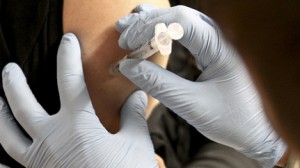Good Health Requires Vaccines, Even Adults
Apr 3rd, 2013
 Vaccines have prevented millions of deaths around the world. The development of the vaccine kicked off an era of illness prevention, unlike anything the world has ever seen. Once your immune system is trained to resist a disease, you are said to be immune to it. The beauty of vaccines is that they help the body develop disease fighting abilities without making you sick. They don’t only protect the person immunized but also the people around them who may not be able to get immunized.
Vaccines have prevented millions of deaths around the world. The development of the vaccine kicked off an era of illness prevention, unlike anything the world has ever seen. Once your immune system is trained to resist a disease, you are said to be immune to it. The beauty of vaccines is that they help the body develop disease fighting abilities without making you sick. They don’t only protect the person immunized but also the people around them who may not be able to get immunized.
Vaccines usually contain parts of the dead or weakened bacteria or virus. Once you have received the vaccine, your body begins to produce antibodies to protect you from the disease. Should you actually come in contact with the disease, your body will begin fighting it off again, but you will not become sick. Some vaccines, like tetanus, require a booster to remind your body how to fight off the bacteria again.
Babies and children have always been a major focus of the vaccine movement. “Vaccines are not just for babies anymore,” says Angie Matthiessen, MSW, of Immunize Georgia and Children’s Healthcare of Atlanta. Public health experts want to make sure adolescents, adults and the elderly stay up-to-date with their immunizations. “Many adolescent and adult vaccines are now in place, often to protect the very young and elderly,” Matthiessen added.
Many of the vaccines we received as children to create immunity to infectious diseases last a lifetime but not all of them, like diphtheria and tetanus vaccines. They need to be updated every ten years to maintain immunity. According to the Centers for Disease Control and Prevention (CDC), as adults, you need immunizations to get and maintain protection against:
- Seasonal influenza (flu)
- Tetanus, Diphtheria and Pertussis (whooping cough)
- Shingles (for adults 60 years and older)
- Pneumococcal disease
- Hepatitis B infection (for adults with diabetes or at risk for Hepatitis B)
Other vaccinations you may need include those that can protect against human papillomavirus (which can cause certain cancers), hepatitis A, and chicken pox. If you are traveling outside the United States, you may need additional vaccines, according to CDC. Ask your physician which vaccine you need.
Health insurance companies play a crucial role in making vaccines accessible. A comprehensive health insurance plan can cover the cost of necessary immunizations, ensuring that individuals stay protected against preventable diseases. The Advisory Committee of Immunization Practices (ACIP) recommends that the human papillomavirus (HPV) vaccine be given to all adult females through the age of 26. The ACIP also recommends one or more doses of measles, and mumps rubella vaccine (MMR) be administered to adults in certain age groups and with certain risk factors. If you are pregnant or planning to be pregnant, it is important that you maintain your immunizations current. According to the CDC, the benefits of vaccinating pregnant women usually outweigh the risks of vaccine. Risks to a developing fetus from a vaccine are largely theoretical, while risks to a fetus from an infectious disease contracted by the mother are well documented.
Related posts from our blog:
No related posts.
Tags: vaccines